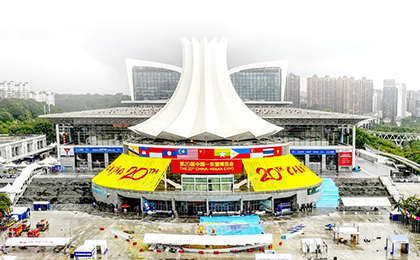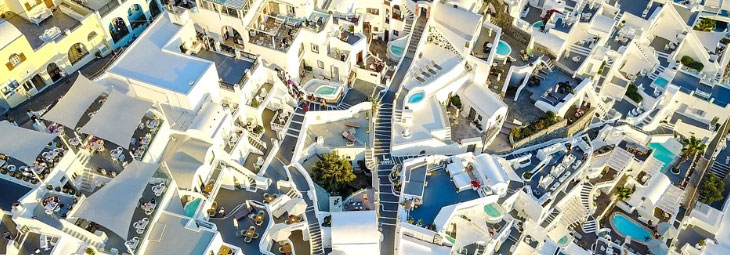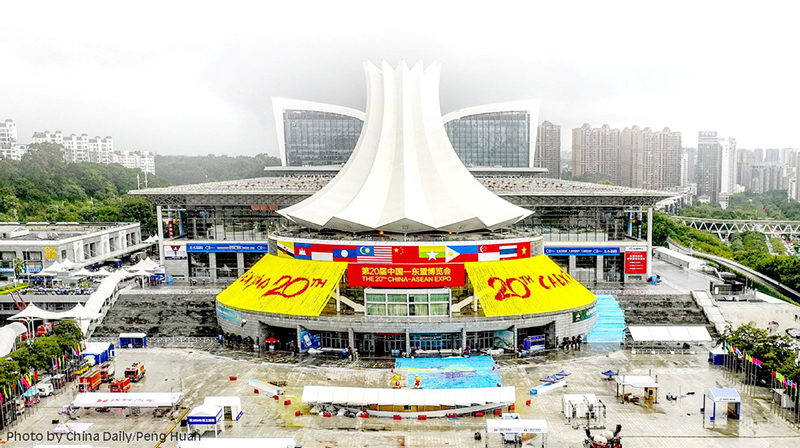



▲ A view of the venue for the 20th China-ASEAN Expo in Nanning, South China's Guangxi Zhuang autonomous region. [China Daily/Peng Huan]
Nanning is the capital city of the Guangxi Zhuang Autonomous Region, a core city of the Beibu Gulf urban cluster, a key node of the New International Land-Sea Trade Corridor, and the provincial capital city closest to ASEAN countries. It serves as the permanent host city of the China-ASEAN Expo. Nanning shoulders a significant historical role incomprehensively implementing the new mission of "Three Major Positioning", consolidating and developing ethnic unity, maintaining social stability and border security, establishing a cross-border industrial integration and development zone for China-ASEAN cooperation, and driving high-quality development in Guangxi and the Beibu Gulf urban cluster.
1. City Designated Function.
Nanning is the capital city of the Guangxi Zhuang Autonomous Region, an important central city in South China, and a comprehensive national transportation hub.
2. Core Functions.
As a gateway for opening up to ASEAN, Nanning focuses on enhancing its functions as an international hub for facilitating the China-ASEAN community of shared destiny. These include international exchange, industrial cooperation, scientific and technological innovation, service trade, and transportation and logistics. The city is committed to becoming an international metropolis dedicated to fostering open collaboration with ASEAN.
3. Development Goals.
By 2025, the city aims to establish a preliminary framework for high-quality territorial development and protection. This includes improvements in the safeguarding of food security, ecological preservation, water and energy resources, and natural disaster prevention. The efficient and economical use of land will be significantly enhanced, while the city’s core functions will be further strengthened. Urban spatial quality and ecological livability will be constantly improved, along with the city’s capacity for comprehensive spatial governance. Nanning will see substantial improvements in its carrying capacity, competitiveness, influence, and regional reach. A China-ASEAN cross-border industrial integration zone will take shape, and the city will make solid progress toward becoming an international metropolis that fosters ASEAN collaboration.
By 2035, a secure, sustainable, and competitive territorial development and protection framework will be basically established. The city’s ecological security structure will be further stabilized, with significant advancements in the efficiency and effectiveness of territorial utilization. The charm and appeal of its territorial space will be fully realized, and a modern governance system for territorial space will be further developed. Nanning will complete the construction of the China-ASEAN cross-border industrial integration zone and achieve its fundamental transformation into an international metropolis dedicated to ASEAN cooperation.
By 2050, the city envisions comprehensive enhancement of material, political, cultural, social, and ecological civilizations. Green development and sustainable lifestyles will be fully established, and governance systems and capabilities will reach a high level of modernization. By this time, Nanning will be fully developed as an international metropolis actively engaged in open cooperation with ASEAN.
4. Four Strategies.
4.1 Sustainable security strategy.
Achieve high-efficiency governance through a transition from policy protection to systematic governance, safeguarding the bottom line of urban safety while optimizing the overall layout of the "three zones and three lines" (ecological, agricultural, and urban development).
4.2 High-efficiency clustering strategy
Promote high-quality development by transitioning from population clustering to regional leadership, optimizing the urban spatial structure, and enhancing the city’s core regional development functions.
4.3 Hub reconstruction strategy.
Support the new development paradigm by leveraging water ports, land ports, and airports to reconstruct the city’s hub framework and establish a gateway hub for ASEAN.
4.4 Green city upgrade strategy.
Provide a high-quality living environment by advancing from green city construction to eco-livable development. This strategy prioritizes a people-centered approach to upgrade Nanning's identity as "China’s Green City."
Source:
<https://mp.weixin.qq.com/s/pIvve09Ct3OLzU2iJOcjDQ>
Editor & Translator: GUO Xinxin